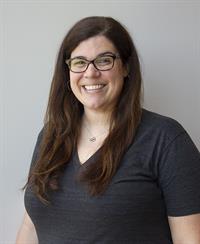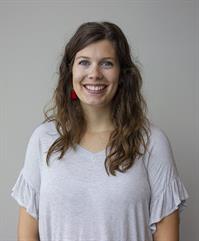This fall, with the retirement of Dr. Dottie Willis and the departure of Dr. Belinda Harlow, come two (somewhat) new faculty faces.
When she heard about an opening for a professor of adolescent literacy at Bellarmine, Louisville native and Ohio State Ph.D. student Caitlin Murphy was hesitant to tell her family she could be coming home—not because she didn’t want them to know, but because it sounded too good to be true.
 Dr. Murphy never intended to go very far, but in 2006, when she finished her bachelor’s degree, the Louisville public school job market was saturated. The opposite was true in Northern Virginia, though, and she taught 10th grade English amongst a teacher shortage there. As the only teacher there without a master’s degree, she went on to study English Education at Wake Forest University and returned to Kentucky to join the pioneering staff at Martha Layne Collins High School in Shelby County. Five years in, she took up a former principal on his advice to pursue a Rank I—“and he said, ‘You know, a Rank I could be a Ph.D,’” she says. Off to Columbus she went.
Dr. Murphy never intended to go very far, but in 2006, when she finished her bachelor’s degree, the Louisville public school job market was saturated. The opposite was true in Northern Virginia, though, and she taught 10th grade English amongst a teacher shortage there. As the only teacher there without a master’s degree, she went on to study English Education at Wake Forest University and returned to Kentucky to join the pioneering staff at Martha Layne Collins High School in Shelby County. Five years in, she took up a former principal on his advice to pursue a Rank I—“and he said, ‘You know, a Rank I could be a Ph.D,’” she says. Off to Columbus she went.
Dr. Murphy will be the first to tell you that an encouraging word can make all the difference; in her case, it was from a high school math teacher. “He made me feel successful with something I’d had trouble with all my life, and that was very powerful,” she says. “He was one of the most transformational teachers I ever had, and that changed me as a learner.” He shared her enthusiasm when she received her first A in algebra, and that further added to her drive to become a teacher. “I knew I wanted to be a high school English teacher, to build relationships and work with youth—not a top-down sort of thing.” But soon, she knew she could do even more as a professor: “I did my Ph.D. so I could grow new teachers,” she says.
As for the Bellarmine position, she learned about it from a friend who had met Dr. Elizabeth Dinkins at a conference the three of them attended last fall. She was “shocked” when she learned of the opening back in her hometown, in her very specialty: “Adolescent literacy!” she thought. “Man, this is so perfect”—and it remains so. To her, Dr. Murphy says, literacy “is so much more than reading and writing. It’s our way of communicating with people, communicating with different groups, communicating with different cultures.”
 Dr. Alexandra “Ali” Taylor may already be familiar to some in the School of Education, having successfully defended her dissertation this past March—and before then, she received her bachelor’s degree from the School. (She earned her master’s in Elementary Education and attained her principal certification at Indiana University Southeast in between.) During all her graduate studies, she worked as a special education teacher in Southern Indiana—and even on her maternity leave last year, she didn’t stop. “When my daughter [Eleanor, born last October] was six days old, I went into the field to collect data for my dissertation,” Dr. Taylor says.
Dr. Alexandra “Ali” Taylor may already be familiar to some in the School of Education, having successfully defended her dissertation this past March—and before then, she received her bachelor’s degree from the School. (She earned her master’s in Elementary Education and attained her principal certification at Indiana University Southeast in between.) During all her graduate studies, she worked as a special education teacher in Southern Indiana—and even on her maternity leave last year, she didn’t stop. “When my daughter [Eleanor, born last October] was six days old, I went into the field to collect data for my dissertation,” Dr. Taylor says.
Despite activity being the default for her, being a first-time assistant professor came with its own set of surprises: “I was always so into my role as a student I didn’t consider how much work my professors did. I value how much time they took to get to know me in the small classes.” There are as many as 19 students in Dr. Taylor’s undergraduate classes—a bit over the norm at Bellarmine—but she aims to be as accessible to them as her mentors were to her. “I learned their names and give a lot of feedback. I get there early to talk to students about their lives and just be there for them.”
Dr. Taylor says she always wanted to be a teacher, with her concentration born of growing up with a sibling who has special needs. “Seeing the unique challenges he had as a student made me want to be a special ed teacher,” she says of her brother. Regarding how she hopes to share that interest with the next generation of teachers—and her own child—she says, “I want to impact future special ed teachers and tell them how I was successful in the field. [And] I hope my daughter sees how important education is.”